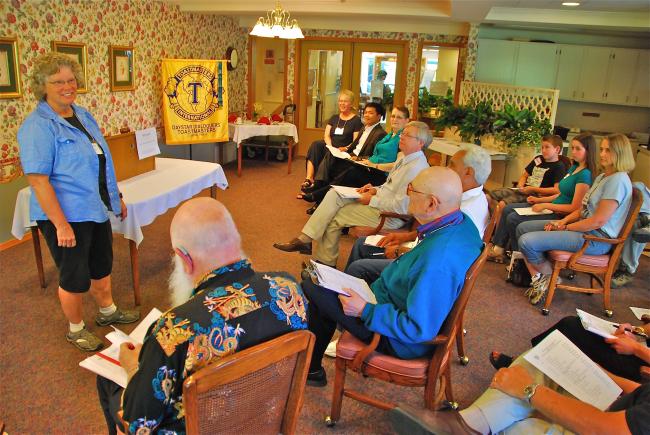Toastmasters Clubs are far more than just public speaking
Gae Taylor speaks at a recent meeting of the Daystar Toastmasters Club.
Wed, 07/28/2010
“What am I doing up here?!”
You may have asked yourself that question as you stood up to address an audience. If you’re like most people, you’ve asked that question more than once. Public speaking can be one of the most anxiety-producing activities we engage in, but it is also an essential skill for anyone who wants to assume a leadership role in their profession or community. So, what do you do?
DOWNLOAD AND LISTEN TO A SPECIAL TOASTMASTERS PODCAST
For many West Seattleites, the answer is to join a Toastmasters club. Toastmasters International is the most recognized name in public-speaking training with over 12,500 clubs worldwide and three of them are right here in West Seattle. The Daystar club meets at the Daystar Retirement Village at noon on Mondays, West Seattle Toastmasters Club #832 meets every other Tuesday evening at The Kenney Retirement Community, and Earlybirds meets Friday mornings at ArtsWest.
A Toastmasters meeting is a curious blend of social gathering and training session. Members get to know each over refreshments and through their speeches as well. “The Daystar club started in a retirement center and we have a lot of retirees in the club,” said Brian Nordby. “The stories they would tell… about people coming across on boats. It just amazed me how much history was there.”
“Table Topics (impromptu speaking) turned out to be a lot of fun,” said Jacki McCarthy.
“You sit there and don’t want to be called upon but once you are the sky’s the limit. You can say whatever you want. It doesn’t have to be true, it doesn’t have to be real—or it can be—and I enjoy listening to what people come up with. It’s true, on-the-spot storytelling.”
Along with the fun, there is some serious training going on. Look around a Toastmasters meeting and you’ll notice that everyone is working from a training manual. Toastmasters international had been training speakers for over 85 years and it has developed a sophisticated curriculum designed to give speakers of all levels an essential skill set. The first manual given to new members lays out a series of 10 speeches that emphasize such things as organization, effective use of gestures, putting some variety into your voice and, of course, confidence.
“The first time I got up to speak,” said Brian Nordby, “I was shaking in my shoes and I grabbed onto the lectern like I was riding a bronco.”
Toastmasters clubs work hard to create a positive environment for their speakers. Members progress at their own speed and there are many opportunities to speak at each meeting—some of them as short as one minute. And, the audience is always enthusiastic. The central tenet of the organization is that members are committed to each other’s success. After all, everyone is in the same boat and applause is liberally sprinkled throughout the meetings.
Club members tend to be enthusiastic about the evolution of their speaking abilities and the confidence they now feel in front of an audience.
“I am a much better speaker and a much better leader,” said Franni Turean. “I joined Toasmasters because I needed to learn how to run a meeting using Roberts Rules of Order which I knew nothing about. Toastmasters clubs follow Roberts Rules of Order though not in a slavish way. I was able to learn meeting structure plus leadership skills. When I needed to run meetings within the business realm I did very well.”
Toastmasters has had a big impact on a lot of people’s lives. In fact, when you find yourself listening to a polished speaker, there’s a good chance they have Toastmasters experience. Actors Tim Allen and Leonard Nimoy, political commentator Chris Matthews, and astronaut James Lovell are all former Toastmasters.
To find a West Seattle Toastmaster club near you go to the District 2 Toastmasters website at www.d2tm.org. Click on the “find a club” button for meeting times and locations.


